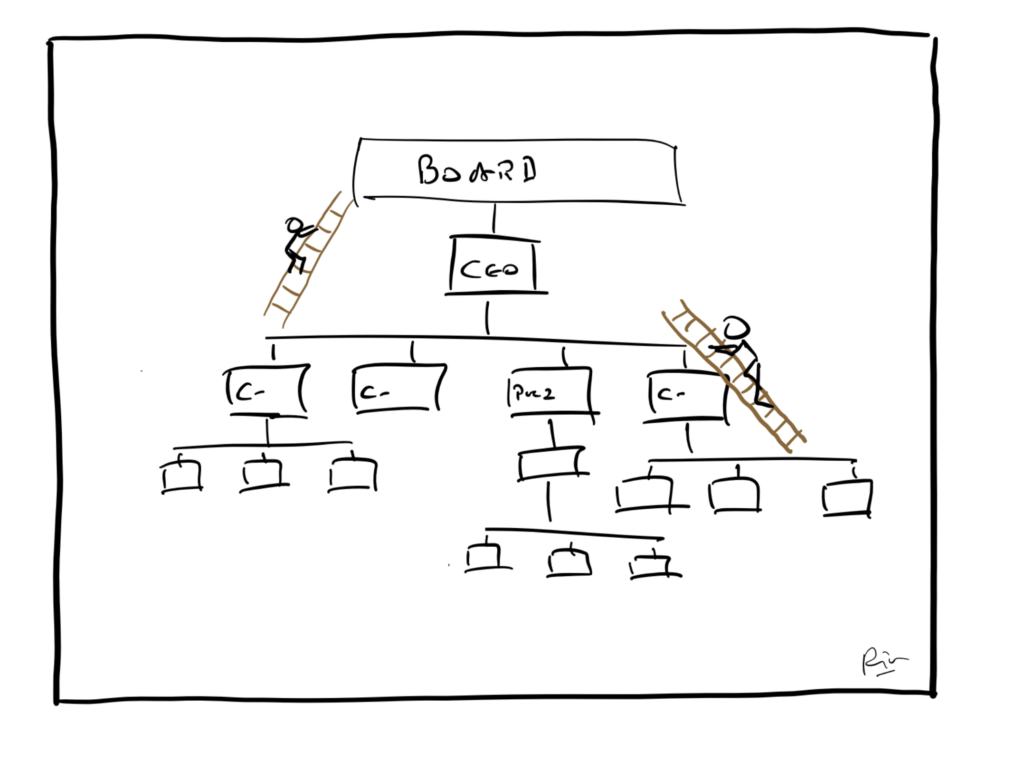
You are a team leader. You’ve just learned that one of your direct reports, whose work product has been poor lately, has been corresponding with your boss about how demanding you are.
Or maybe you are the CEO, and you just heard that a board member is having one on one conversations with someone who is your direct report, who happens to have disagreed with one of your recent decisions…
These situations present a threat to an important leadership construct – Chain of Command. In simple terms, the threat comes when someone skips a link in the Chain of Command. They skip up past their boss to their boss’s boss, or, more commonly, a senior leader skips downward in the organization to someone who works a level or more beneath them.
Has this ever happened to you? If so, what was the impact?
First, trust takes a hit. Those involved start to get suspicious – who is saying what to whom? Why aren’t they talking to me? Who is really the leader here? In quick succession, healthy communication goes south, and accountability for people and projects gets fuzzy. If you are a leader, you know when your Chain of Command has been violated. Someone has gone around you, instead of coming to you directly.
Chain of Command provides a clear and organized structure for decision-making, communication and accountability. When it gets compromised, leadership is weakened and risks the label ‘dysfunctional’. A leader who was responsible for giving direction to and owning the outcomes of their team, has been disempowered in some way. Someone else is now calling the shots.
Let me pause here for an important caveat for situations where someone skips upward…
Chain of Command is not always perfect – occasionally there are bad actors in leadership roles who impose rigid control so their direct reports will, out of fear, do everything they are told – including actions that are unethical or immoral. When a boss is abusing his or her power – and this requires discernment by the direct report – it can be appropriate to reach out to another leader for help. By contrast, a good leader welcomes questions from their direct reports, and is open to discovery of problem areas. But a leader should never exploit a direct report with their position.
Here are some tips for maintaining integrity of the Chain of Command, especially if you are a senior leader tempted to ‘skip downward’:
Stop it if you see it. If you are the more senior leader, you have a responsibility to ensure integrity of the Chain of Command. Don’t break it in the first place. And if someone goes around their leader up to you, make it clear to them you are not their new leader. Ask them what they have done to speak with their boss about their concerns.
Listen, but don’t direct. You can listen to a direct report’s concerns, but don’t be quick to agree with them – that they are right and their boss must be wrong. Take in information. If you give them a signal or direction without their leader present, you risk undermining that leader.
Stay curious. You may be at the top of the Chain of Command as a board member or C-level executive, but there is a good chance you are still not getting all the facts in a given situation. Carefully gather information to get the full picture. Then take action.
Reinforce or replace. Do your homework to determine if a junior person’s complaints about their leader are legitimate or not, including talking directly with that leader. If there is a real problem, then make a change with the leader. But if not, make clear your support for them.
With good leaders at every level, Chain of Command provides the most efficient framework for running an organization. Do your part to strengthen and encourage an effective Chain of Command.
Maintaining the integrity of Chain of Command is vital to keep leadership decision-making, communication, and accountability clear and organized. If you are looking to fortify stronger links in your Chain of Command, contact us. McKinnon Leadership Group can help.